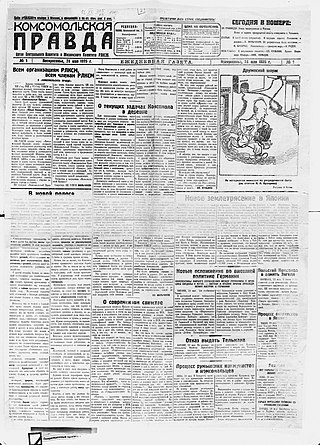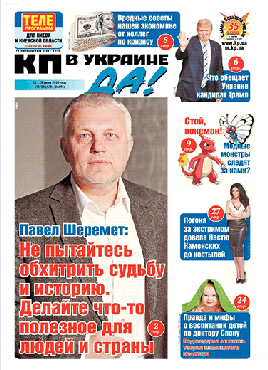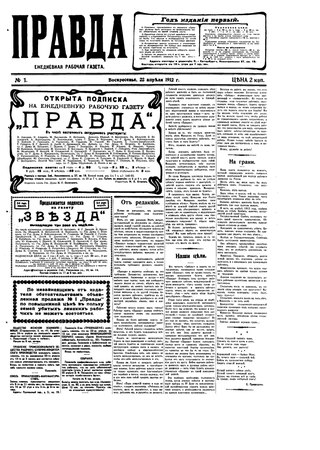Pravda (Russian for "truth" and "justice") is a Russian newspaper, formerly the official newspaper of the Communist Party of the Soviet Union.
Contents
Pravda ("truth" in various Slavic languages) may also refer to:
Pravda (Russian for "truth" and "justice") is a Russian newspaper, formerly the official newspaper of the Communist Party of the Soviet Union.
Pravda ("truth" in various Slavic languages) may also refer to:
KP may refer to:

Alexei Grigoryevich Stakhanov was a Soviet miner, Hero of Socialist Labour (1970), and a member of the CPSU (1936).

Komsomolskaya Pravda is a daily Russian tabloid newspaper that was founded in 1925. Its name is in reference to the official Soviet newspaper Pravda 'Truth'.

Ukrainska Pravda is a Ukrainian online newspaper founded by Georgiy Gongadze on 16 April 2000. Published mainly in Ukrainian with selected articles published in or translated to Russian and English, the newspaper is tailored for a general readership with an emphasis on the politics of Ukraine.
Natalia is a female given name with the original Late Latin meaning of "Christmas Day".
An insider is a member of a group of people of limited number and with restricted access.

Michaela is a female given name. It is a female form of the Hebrew name Michael (מִיכָאֵל), which means "Who is like God".
Nikolay Nikolayevich Urvantsev was a Soviet geologist and explorer. He was born in the town of Lukoyanov in the Lukoyanovsky Uyezd of the Nizhny Novgorod Governorate of the Russian Empire to the family of a merchant. He graduated from the Tomsk Engineering Institute in 1918.
Katya is a feminine given name. It is a very popular name in Russia, Ukraine, Bulgaria, Serbia, and North Macedonia. It is a Russian diminutive form of Yekaterina, which is a Russian form of Katherine. The name is sometimes used as an independent given name in the English-speaking world. In German, Dutch and Scandinavian languages it is spelled Katja. Katya may also refer to:

Yaroslav Kirillovich Golovanov was a Russian journalist, writer and science communicator. He covered space exploration by the Soviet Union from its beginnings.
Steamer Pravda was a Soviet merchant freighter of about 3,100 tonnes displacement, which was active in the Soviet Arctic during the 1930s. This ship had been normally used for carrying timber. It was named after Soviet newspaper Pravda.
SS Volodarskiy was a Soviet freighter of about 3,100 tonnes displacement which was active in the Arctic during the 1930s. This ship had been normally used for carrying timber.

Television, magazines, and newspapers have all been operated by both state-owned and for-profit corporations which depend on advertising, subscription, and other sales-related revenues. Even though the Constitution of Russia guarantees freedom of speech, the press has been plagued by both government censorship and self-censorship.

Admiral is a 2008 biopic about Alexander Kolchak, a vice admiral in the Imperial Russian Navy and leader of the anti-communist White movement during the Russian Civil War. The film also depicts the love triangle between the Admiral, his wife, and the poet Anna Timiryova.
Vera is a female given name of Slavic origin, and by folk etymology it has also been explained as Latin vera meaning "true". In Slavic languages, Vera means faith. The name Vera has been used in the English speaking world since the 19th century and was popular in the early 20th century. In Turkish Vera means piety.

KP in Ukraine is a Ukrainian newspaper published six times a week in Kyiv, the nation's capital. It is a Ukrainian language newspaper with some regional editions in the Russian language.

Valery Yakovlevich Leontiev is a Soviet and Russian pop singer, sometimes songwriter and actor whose popularity peaked in the early 1980s. He was titled a People's Artist of Russia in 1996. He is known as one of the most prominent artists of Soviet and Russian music. Over the course of his decades-long career, he has recorded more than 30 albums, many of which sold millions of copies. The media refers to Leontiev as a megastar and a legend of the Russian stage.

Olena Sergeyevna Berkova is a Ukrainian-Russian former glamour model and pornographic actress, television presenter, singer and actress.

Pravda is a Russian broadsheet newspaper, and was the official newspaper of the Central Committee of the Communist Party of the Soviet Union, when it was one of the most influential papers in the country with a circulation of 11 million. The newspaper began publication on 5 May 1912 in the Russian Empire, but was already extant abroad in January 1911. It emerged as the leading government newspaper of the Soviet Union after the October Revolution. The newspaper was an organ of the Central Committee of the CPSU between 1912 and 1991.

Larisa Andreyevna Guzeyeva is a Soviet and Russian theater and film actress and television host. She is a Meritorious Artist of Russia and honored artist of the Russian Federation in 1994. She is a member of the public organization "Union of Cinematographers of the Russian Federation". She was awarded the Order of Friendship of the Russian Federation in 2011.